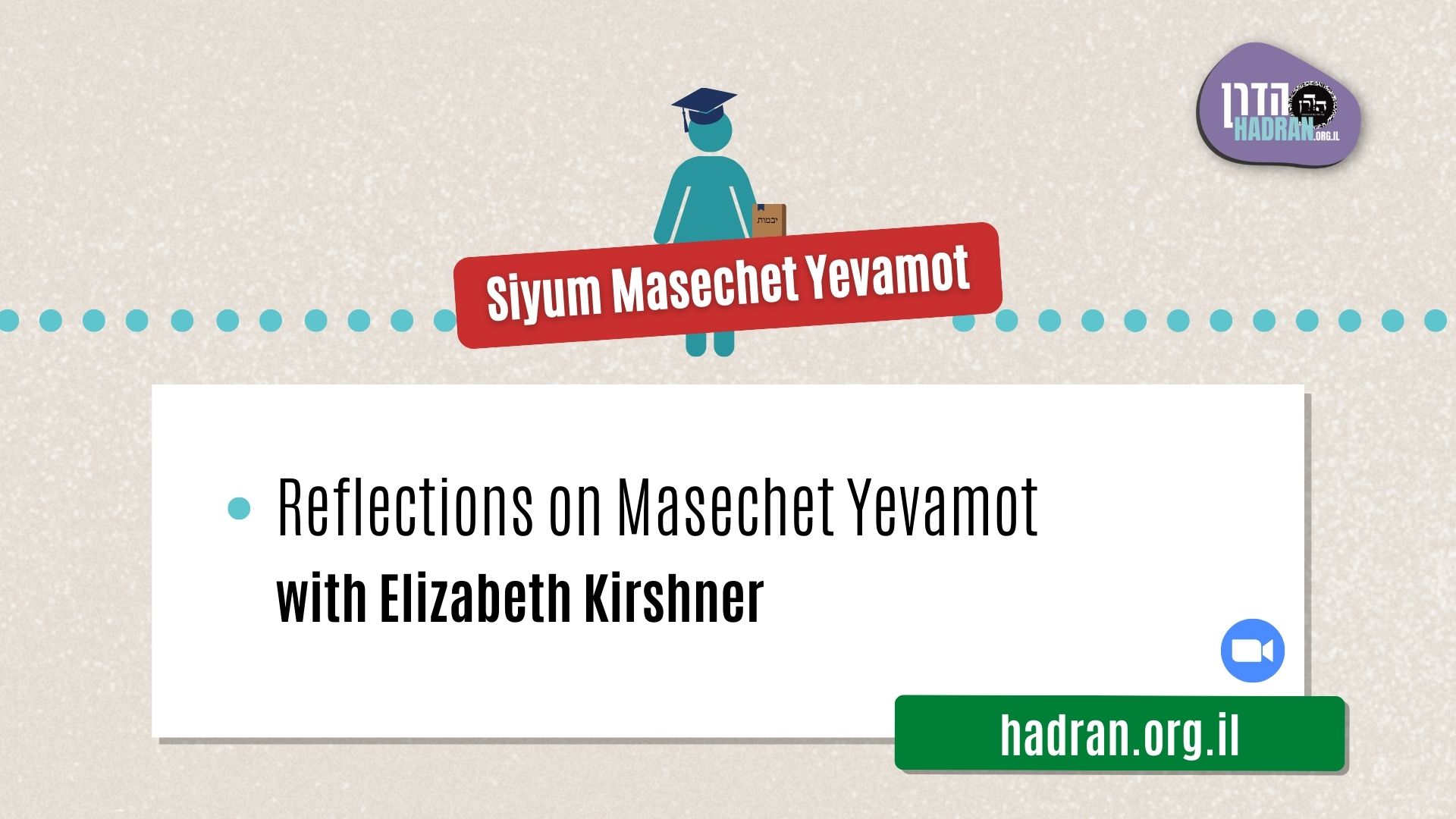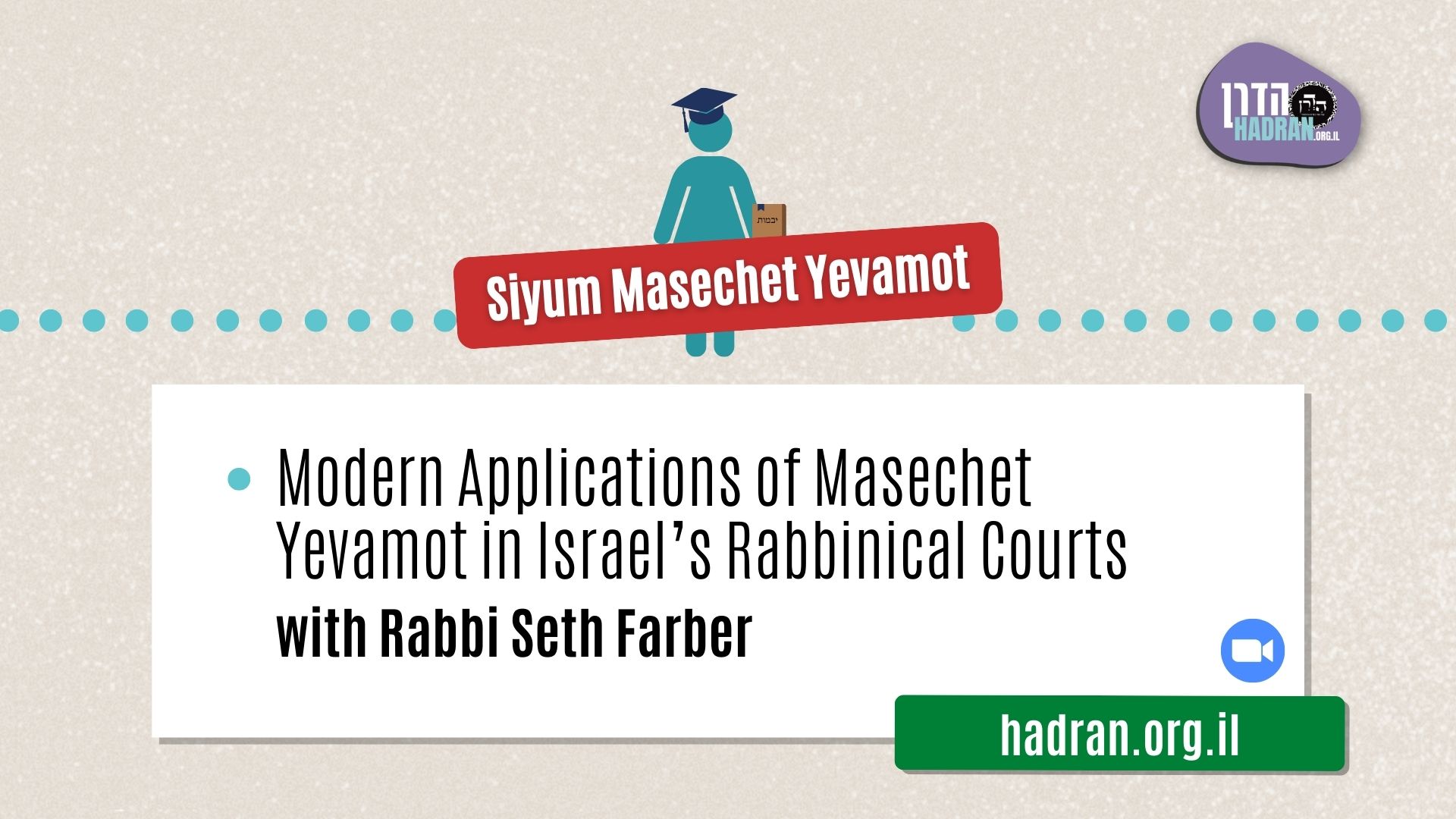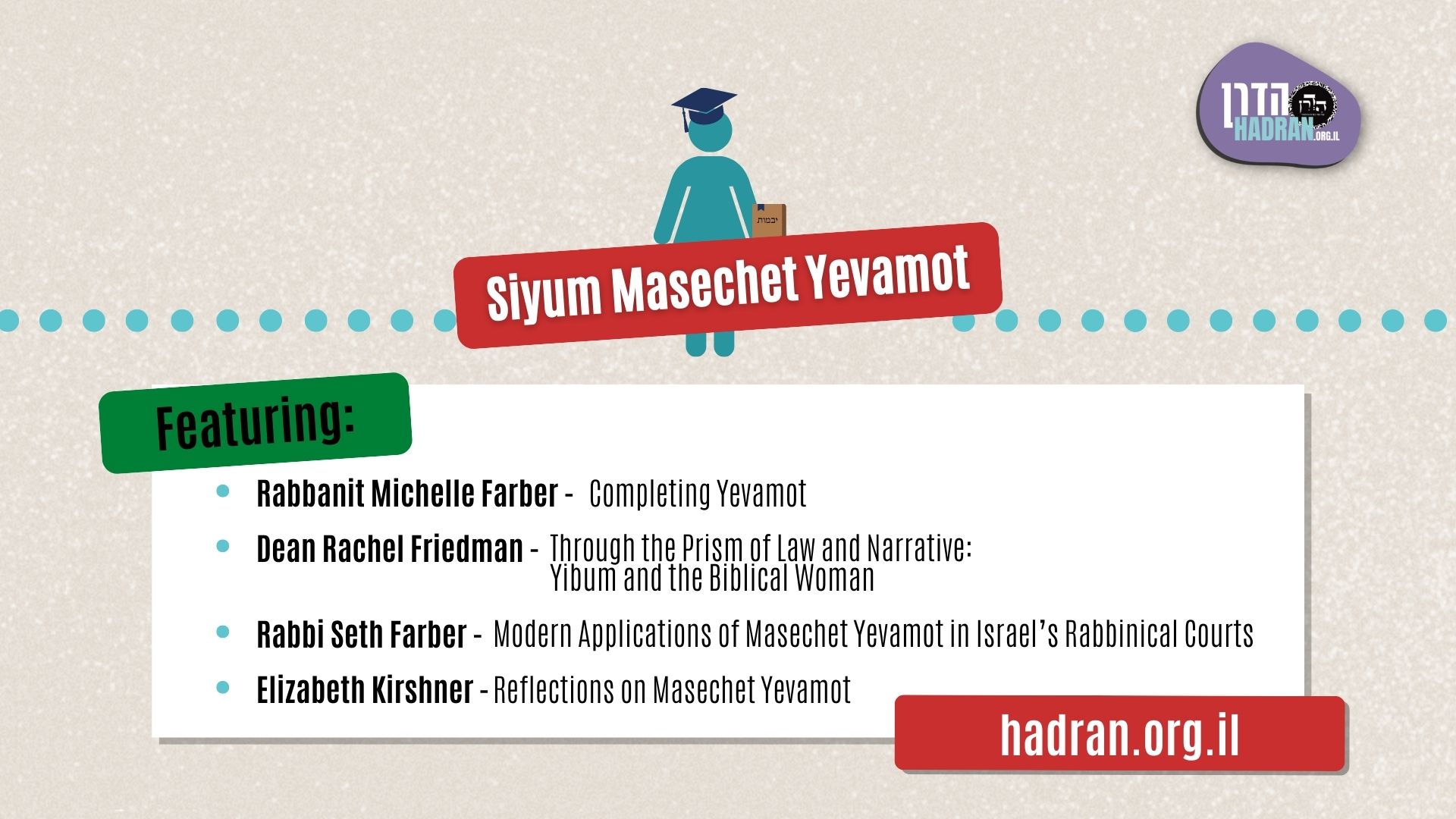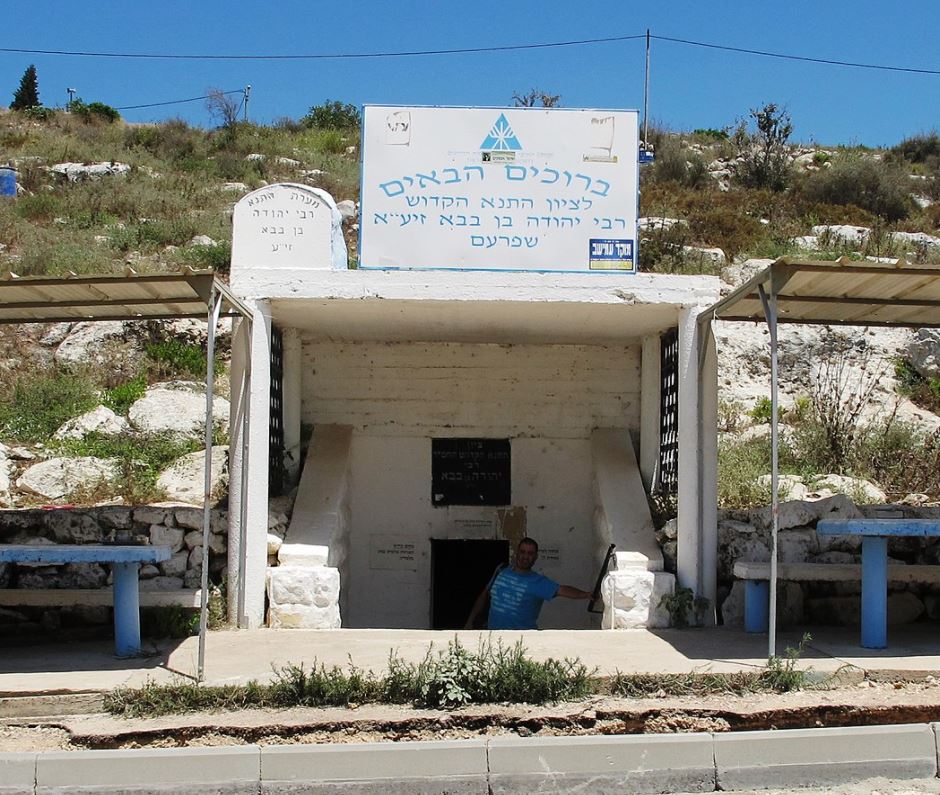Yevamot 34
וּמַאן הַאי תַּנָּא דְּאִית לֵיהּ אִיסּוּר כּוֹלֵל וְאִיסּוּר מוֹסִיף וְאִיסּוּר בַּת אַחַת?
The Gemara asks: According to Rabbi Ḥiyya, who teaches that this case incurs sixteen sin-offerings, who is this tanna who holds that a prohibition takes effect where another prohibition already exists for a more inclusive prohibition, an expanded prohibition, and a simultaneous prohibition? If these men are brothers, the moment that one betrothed a woman, that woman was immediately rendered forbidden to the second brother both as a married woman and as his brother’s wife. When the second brother betrothed her sister, this added the prohibition pertaining to his wife’s sister. This is a more inclusive prohibition because, as a result of this betrothal, the second brother is prohibited from engaging in sexual intercourse not only with his wife’s sister, who is his brother’s wife, but also with all of her other sisters. When this woman becomes a menstruating woman, she is forbidden to her husband as well, which is an expanded prohibition. Consequently, the mishna includes examples of all three types of prohibitions and asserts that they all take effect in this case. Therefore, the Gemara wonders which tanna holds that in each of these cases the prohibition takes effect even where another prohibition exists.
אָמַר רַב יְהוּדָה אָמַר רַב: רַבִּי מֵאִיר הִיא. דְּתַנְיָא: יֵשׁ אוֹכֵל אֲכִילָה אַחַת וְחַיָּיב עָלֶיהָ אַרְבַּע חַטָּאוֹת וְאָשָׁם אֶחָד.
Rav Yehuda said that Rav said: This is the opinion of Rabbi Meir, as it is taught in a baraita: There is one who performs a single act of eating an olive-bulk of food, and he is liable to bring four sin-offerings and one guilt-offering.
טָמֵא שֶׁאָכַל חֵלֶב, וְהוּא נוֹתָר מִן מוּקְדָּשִׁין, בְּיוֹם הַכִּפּוּרִים.
How so? This halakha applies to one who is ritually impure who ate forbidden fat that was notar from a consecrated offering, i.e., it remained after the time when it was permitted to eat it, and this occurred on Yom Kippur. One who did this is liable to bring one sin offering for eating consecrated food while impure, one for eating forbidden fat, one for eating notar, and one for eating on Yom Kippur. He is also liable to bring a guilt-offering for misuse of consecrated items. In this case, it was prohibited to eat the fat from the moment the animal was born. When the animal was consecrated, the prohibition against deriving benefit from it took effect on the entire animal, rendering this an expanded prohibition. When the priest became ritually impure and thereby prohibited from partaking of all sanctified foods, a more inclusive prohibition took effect. The moment the fat was rendered notar, it became prohibited to offer it on the altar as well, so that that is another instance of an expanded prohibition. Lastly, on Yom Kippur, an additional, more inclusive prohibition took effect because on Yom Kippur it is prohibited to eat all food, even that which is not consecrated.
רַבִּי מֵאִיר אוֹמֵר: אִם הָיְתָה שַׁבָּת וְהוֹצִיאוֹ בְּפִיו — חַיָּיב. אָמְרוּ לוֹ: אֵינוֹ מִן הַשֵּׁם.
Rabbi Meir says: There is one more sin-offering for which he may be liable. If it was Shabbat and he carried this olive-bulk of food from one domain to another in his mouth, he is liable for carrying out on Shabbat. The Rabbis said to Rabbi Meir: Liability for the sin-offering that you added is not incurred from violation of the same type of prohibition. He is liable for carrying out the food, not for eating it. In this example, the prohibitions of Shabbat and Yom Kippur take effect at the same moment, and therefore this last case would be an instance of simultaneous prohibitions, and Rabbi Meir holds that they take effect as well. Therefore, this baraita demonstrates that Rabbi Meir holds that prohibitions take effect where other prohibitions already exist in all of these instances: More inclusive prohibitions, expanded prohibitions, and simultaneous prohibitions.
וְרַבִּי מֵאִיר אַלִּיבָּא דְּמַאן? אִי אַלִּיבָּא דְּרַבִּי יְהוֹשֻׁעַ, הָאָמַר: טָעָה בִּדְבַר מִצְוָה — פָּטוּר. אֶלָּא אַלִּיבָּא דְּרַבִּי אֱלִיעֶזֶר.
The Gemara continues to clarify the opinion of Rabbi Meir: And in accordance with whose opinion is the statement of Rabbi Meir? If you say that it is in accordance with the opinion of Rabbi Yehoshua, this is difficult. Didn’t Rabbi Yehoshua say that one who erred with regard to a mitzva is exempt from bringing a sin-offering, i.e., one who unwittingly performed a transgression while intending to perform a mitzva is exempt from punishment? In the case in the mishna as well, the men intended to perform the mitzva of marriage but unwittingly violated a transgression because the wives were switched. Therefore, according to the opinion of Rabbi Yehoshua, they should be exempt from a sin-offering. Rather, this must be in accordance with the opinion of Rabbi Eliezer, who holds that even if one mistakenly transgressed while attempting to perform a mitzva, he is still obligated to bring a sin-offering.
אִיבָּעֵית אֵימָא: לְעוֹלָם אַלִּיבָּא דְּרַבִּי יְהוֹשֻׁעַ, כִּי קָאָמַר רַבִּי יְהוֹשֻׁעַ טָעָה בִּדְבַר מִצְוָה פָּטוּר, הָנֵי מִילֵּי גַּבֵּי תִּינוֹקוֹת — דִּזְמַנּוֹ בָּהוּל, אֲבָל הַאי, כֵּיוָן דְּאֵין זְמַנּוֹ בָּהוּל — לָא.
If you wish, resolve this differently and say: Actually, this can be explained even according to the opinion of Rabbi Yehoshua. When Rabbi Yehoshua says that one who erred with regard to a mitzva is exempt, this applies only to the case of babies who were mixed up in such a way that on Shabbat the mohel mistakenly circumcised a baby whose time had not yet come for circumcision. Since the mohel did not fulfill the mitzva of circumcision, he should be liable for performing prohibited labor on Shabbat. However, Rabbi Yehoshua exempts him from a sin-offering since he is pressed for time. Because circumcision must be performed only on the day specified, he was rushed and anxious to perform the circumcision, and due to this sense of urgency he erred and thought that the proper time was on Shabbat. In this case in the mishna, however, where the mistake involved marriage, since the brothers were not pressed for time Rabbi Yehoshua does not deem the brothers exempt.
וַהֲרֵי תְּרוּמָה, דְּאֵין זְמַנּוֹ בָּהוּל, וְקָפָטַר! דִּתְנַן: הָיָה אוֹכֵל בִּתְרוּמָה, וְנוֹדַע שֶׁהוּא בֶּן גְּרוּשָׁה אוֹ בֶּן חֲלוּצָה, רַבִּי אֱלִיעֶזֶר מְחַיֵּיב קֶרֶן וָחוֹמֶשׁ, וְרַבִּי יְהוֹשֻׁעַ פּוֹטֵר.
The Gemara objects: And yet in the case of eating teruma, where one is not pressed for time and nevertheless Rabbi Yehoshua exempts him if the act involved a mitzva, as we learned in a mishna (Pesaḥim 72b): If a priest was partaking of teruma and it became known that he was the son of a divorced woman or the son of a ḥalutza and thereby disqualified from the priesthood and prohibited from eating teruma, Rabbi Eliezer deems him liable to pay the value of the principal and an additional fifth, like any non-priest who unwittingly ate teruma. However, Rabbi Yehoshua exempts him because at the time of consumption he intended to perform a mitzva, for he thought that he was a priest eating of the teruma.
הָא אִיתְּמַר עֲלַהּ, אָמַר רַב בִּיבִי בַּר אַבָּיֵי: הָכָא בִּתְרוּמָה בְּעֶרֶב הַפֶּסַח עָסְקִינַן — דִּזְמַנָּהּ בָּהוּל.
The Gemara responds: But wasn’t it stated with regard to that mishna: Rav Beivai bar Abaye said: Here we are dealing with leavened teruma that was being eaten by the priest on the eve of Passover, for he is pressed for time. In this case, he would rush to eat it so that it would not have to be burned.
וְאִי בָּעֵית אֵימָא: בְּאִיסּוּר בַּת אַחַת, וְאַלִּיבָּא דְּרַבִּי שִׁמְעוֹן.
The Gemara offers a different attribution of the mishna: And if you wish, say a different explanation: The mishna is not according to the opinion of Rabbi Meir, who deems one liable in cases of more inclusive prohibitions and expanded prohibitions. Rather, the mishna is referring only to cases of simultaneous prohibitions, and in accordance with the opinion of Rabbi Shimon.
בִּשְׁלָמָא כּוּלְּהוּ מַשְׁכַּחַתְּ לְהוּ: דְּשַׁוִּינְהוּ שָׁלִיחַ, וְשַׁוּוֹ אִינְהוּ שָׁלִיחַ, וּפְגַע שָׁלִיחַ בְּשָׁלִיחַ. אֶלָּא נִדּוּת הֵיכִי מַשְׁכַּחַתְּ לַהּ?
The Gemara asks: Granted, with regard to all of the prohibitions in the mishna, you can find that they take effect simultaneously in the case where the men appointed a single agent to betroth the women for them, and the women appointed an agent to accept the betrothals for them, and one agent encounters the other agent. In this scenario, all the men become betrothed to all the women the moment that the agents meet, and the prohibitions all take effect simultaneously. However, with regard to the prohibition pertaining to menstruating women, how can you find the case where both women become menstruating women at the exact time of betrothal?
אָמַר רַב עַמְרָם אָמַר רַב: בְּשׁוֹפְעוֹת מִתּוֹךְ שְׁלֹשָׁה עָשָׂר לְאַחַר שְׁלֹשָׁה עָשָׂר — לְאִחַיּוֹבֵי אִינְהוּ, מִתּוֹךְ שְׁנֵים עָשָׂר לְאַחַר שְׁנֵים עָשָׂר — לְחַיּוֹבֵי אִינְהִי.
Rav Amram said that Rav said: This is referring to a situation where the women continuously discharge menstrual blood from within the thirteenth year of the brothers until after they reached the age of thirteen, in order to deem the men liable for the prohibition pertaining to a menstruating woman. At the moment that the boys reached maturity and the betrothals went into effect, the sisters were forbidden as menstruating women. And the women were continuously discharging blood from within the twelfth year of the women until after the age of twelve, in order to deem the women liable for engaging in relations as a menstruating woman. Therefore, if this took place in such a way that on the exact day when the men reached maturity, i.e., their thirteenth birthday, the women reached maturity, i.e., their twelfth birthday, and at that moment they were menstruating, then all of the prohibitions would take effect simultaneously and they would be liable on all counts, according to Rabbi Shimon as well.
מַפְרִישִׁים אוֹתָן. וְהָא אֵין אִשָּׁה מִתְעַבֶּרֶת בְּבִיאָה רִאשׁוֹנָה! אָמַר רַב נַחְמָן אָמַר רַבָּה בַּר אֲבוּהּ: שֶׁבָּעֲלוּ וְשָׁנוּ. וְאֶלָּא הָא דְּתָנֵי רַבִּי חִיָּיא: הֲרֵי כָּאן שֵׁשׁ עֶשְׂרֵה חַטָּאוֹת, תְּלָתִין וְתַרְתֵּין הָוְיָין!
§ The mishna taught that we separate these women from their husbands for three months, as perhaps they became pregnant. The Gemara asks: But isn’t it known that a virgin woman does not become pregnant from her first sexual act? Rav Naḥman said that Rabba bar Avuh said: This is referring to a situation where they engaged in intercourse and then repeated the act, so that it is possible that the women were impregnated during the second act of intercourse. The Gemara asks: But if this is so, how can one explain that which Rabbi Ḥiyya teaches: Here, then, are sixteen sin-offerings? If there were indeed two acts of intercourse, then there should be thirty-two sin-offerings, since each prohibition was violated twice.
וְלִיטַעְמָיךְ — לְרַבִּי אֱלִיעֶזֶר, דִּמְחַיֵּיב עַל כׇּל כֹּחַ וָכֹחַ — טוּבָא הָוְיָין. אֶלָּא דִּבְכֹחַ רִאשׁוֹן קָחָשֵׁיב, הָכִי נָמֵי, דְּבִיאָה רִאשׁוֹנָה קָחָשֵׁיב.
The Gemara answers: And according to your reasoning, that Rabbi Ḥiyya’s enumeration of sin-offerings applies to all acts of intercourse, then according to the opinion of Rabbi Eliezer, who deems one liable to bring a sin-offering for each and every thrusting movement during a single act of intercourse, there would be many prohibitions that were violated. This would greatly multiply the number of sin-offerings required. Rather, it must be that Rabbi Ḥiyya, with regard to Rabbi Eliezer’s opinion, is enumerating only the first thrusting movement in the intercourse. And so too, with regard to the Rabbis’ opinion, he is enumerating only the first act of intercourse. If there were two acts of intercourse, however, the number of sin-offerings would be doubled.
אֲמַר לֵיהּ רָבָא לְרַב נַחְמָן:
Rava said to Rav Naḥman:
וְהָא תָּמָר בְּבִיאָה רִאשׁוֹנָה אִיעַבַּרָא! אֲמַר לֵיהּ: תָּמָר בְּאֶצְבַּע מִעֲכָה. דְּאָמַר רַבִּי יִצְחָק: כׇּל מוֹעֹכוֹת שֶׁל בֵּית רַבִּי — תָּמָר שְׁמָן, וְלָמָּה נִקְרָא שְׁמָן תָּמָר — עַל שֵׁם תָּמָר שֶׁמִּעֲכָה בְּאֶצְבָּעָהּ. וְהָא הֲווֹ עֵר וְאוֹנָן! עֵר וְאוֹנָן שִׁמְּשׁוּ שֶׁלֹּא כְּדַרְכָּן.
But didn’t Tamar become pregnant from the first act of intercourse, despite the fact that she was a virgin at the time of her sexual act with Judah? Rav Naḥman said: Tamar broke her hymen with her finger prior to intercourse, and it is due to this that she became pregnant from the first act of intercourse, as Rabbi Yitzḥak said: All of those women from the household of Rabbi Yehuda HaNasi who break their hymens are named Tamar by nickname. And why are they named Tamar? They are called this on account of Tamar, who broke her hymen with her finger. The Gemara wonders about the proof from Tamar itself: But weren’t there Er and Onan, her previous husbands, who presumably engaged in sexual intercourse with her? The Gemara responds: Er and Onan engaged in sexual intercourse in an atypical manner, i.e., anal intercourse, and therefore she was still a virgin.
מֵיתִיבִי: כׇּל עֶשְׂרִים וְאַרְבָּעָה חֹדֶשׁ דָּשׁ מִבִּפְנִים וְזוֹרֶה מִבַּחוּץ, דִּבְרֵי רַבִּי אֱלִיעֶזֶר. אָמְרוּ לוֹ: הַלָּלוּ אֵינוֹ אֶלָּא כְּמַעֲשֵׂה עֵר וְאוֹנָן!
The Gemara raises an objection from a baraita: After a woman gives birth, her husband penetrates inside and spills his semen outside for the entire twenty-four months during which the baby is breastfeeding, so that his wife not become pregnant, as that would terminate her milk production and the child might die. This is the statement of Rabbi Eliezer. They said to him: These acts are nothing other than acts similar to those of Er and Onan, which are prohibited. Regardless, it can be deduced from here that Er and Onan engaged in normative sexual intercourse with Tamar, only they did not fully complete the sexual act.
כְּמַעֲשֵׂה עֵר וְאוֹנָן, וְלֹא כְּמַעֲשֵׂה עֵר וְאוֹנָן. כְּמַעֲשֵׂה עֵר וְאוֹנָן, דִּכְתִיב: ״וְהָיָה אִם בָּא אֶל אֵשֶׁת אָחִיו וְשִׁחֵת אַרְצָה״. וְלֹא כְּמַעֲשֵׂה עֵר וְאוֹנָן, דְּאִילּוּ הָתָם שֶׁלֹּא כְּדַרְכָּהּ, וְהָכָא כְּדַרְכָּהּ.
The Gemara answers: The Tosefta actually means that what they did was similar to the act of Er and Onan in some ways, but not similar to the act of Er and Onan in other ways. The Gemara elaborates: It was similar to the act of Er and Onan in that there was a spilling of semen, as it is written: “And it came to pass when he had intercourse with his brother’s wife, that he spilled it on the ground” (Genesis 38:9). Yet it was not similar to the act of Er and Onan, as there Er and Onan engaged in sexual intercourse in an atypical manner, i.e., anal intercourse, while here the Tosefta is referring to sexual intercourse in a typical manner.
בִּשְׁלָמָא אוֹנָן, דִּכְתִיב בֵּיהּ ״וְשִׁחֵת אַרְצָה״, אֶלָּא עֵר מְנָלַן? אָמַר רַב נַחְמָן בַּר יִצְחָק: דִּכְתִיב ״וַיָּמֶת גַּם אוֹתוֹ״, אַף הוּא בְּאוֹתָהּ מִיתָה מֵת. בִּשְׁלָמָא אוֹנָן, מִשּׁוּם ״לֹּא לוֹ יִהְיֶה הַזָּרַע״, אֶלָּא עֵר מַאי טַעְמָא עֲבַד הָכִי? כְּדֵי שֶׁלֹּא תִּתְעַבֵּר וְיַכְחִישׁ יָפְיָהּ.
The Gemara continues to clarify what took place: Granted, Onan engaged in unnatural sexual intercourse with her, as it is written with regard to his act: “That he spilled it on the ground” (Genesis 38:9). However, from where do we derive that Er engaged in unnatural sexual intercourse with her? Rav Naḥman bar Yitzḥak said: As it is written with regard to Onan: “And He slew him also” (Genesis 38:10). This indicates that he, too, died the same death for performing the same transgression as his brother. The Gemara asks: Granted, Onan engaged in anal intercourse because he did not want Tamar to give birth as “he knew that the seed would not be his” (Genesis 38:9). However, with regard to Er, what is the reason he acted in this way? The Gemara responds: He did so in order that she not become pregnant and become less beautiful as a result of her pregnancy.
תָּנוּ רַבָּנַן: ״אוֹתָהּ״, פְּרָט לְכַלָּה, דִּבְרֵי רַבִּי יְהוּדָה. וַחֲכָמִים אוֹמְרִים: פְּרָט לְשֶׁלֹּא כְּדַרְכָּהּ. אֲמַר לֵיהּ הוּן בְּרֵיהּ דְּרַב נַחְמָן לְרַב נַחְמָן: לֵימָא קָא סָבַר רַבִּי יְהוּדָה הַתּוֹרָה חָסָה עַל תַּכְשִׁיטֵי כַלָּה? אֲמַר לֵיהּ: לְפִי שֶׁאֵין אִשָּׁה מִתְעַבֶּרֶת מִבִּיאָה רִאשׁוֹנָה.
The Sages taught: The verse states: “And the woman, with whom a man shall lie giving seed, they shall both bathe themselves in water, and be unclean until the evening” (Leviticus 15:18). The extra term “with whom” comes to exclude a bride who does not become ritually impure; this is the statement of Rabbi Yehuda. And the Rabbis say: It excludes the case of sexual intercourse performed in an atypical manner. Hon, son of Rav Naḥman, said to Rav Naḥman: Shall we say that Rabbi Yehuda holds: The Torah spared a bride’s adornments, including her make-up, and therefore exempted her from submersion in water, as that might cause them ruin? Rav Naḥman said to him: That is not the reason. Rather, it is because a woman does not become pregnant from the first act of intercourse. Therefore, that act of intercourse would not cause ritual impurity, as it is not considered intercourse that can result in the implanting of seed.
בְּמַאי קָמִיפַּלְגִי — רַבָּנַן סָבְרִי: ״שִׁכְבַת זָרַע״, פְּרָט לְהַעֲרָאָה. ״אוֹתָהּ״, פְּרָט לְשֶׁלֹּא כְּדַרְכָּהּ. וְרַבִּי יְהוּדָה סָבַר: שֶׁלֹּא כְּדַרְכָּהּ וְהַעֲרָאָה מִ״שִּׁכְבַת זָרַע״ נָפְקָא. ״אוֹתָהּ״ — פְּרָט לְכַלָּה.
The Gemara asks: With regard to what do Rabbi Yehuda and the Rabbis disagree? The Rabbis hold that the phrase “giving seed” excludes the initial stage of intercourse, during which there is no emission of semen. And the extra phrase “with whom” excludes intercourse that is performed in an atypical way. Rabbi Yehuda, on the other hand, holds that the exclusion of both atypical sexual intercourse and the initial stage of intercourse were derived from the phrase “giving seed,” as neither of these are sexual acts that might bring about the birth of a seed, i.e., a child. The phrase “with whom” then excludes a bride.
כִּי אֲתָא רָבִין אָמַר רַבִּי יוֹחָנָן: כׇּל שֶׁשָּׁהֲתָה אַחַר בַּעֲלָהּ עֶשֶׂר שָׁנִים וְנִשֵּׂאת — שׁוּב אֵינָהּ יוֹלֶדֶת. אָמַר רַב נַחְמָן: לֹא שָׁנוּ אֶלָּא שֶׁאֵין דַּעְתָּהּ לְהִנָּשֵׂא, אֲבָל דַּעְתָּהּ לְהִנָּשֵׂא — מִתְעַבֶּרֶת. אֲמַר לֵיהּ רָבָא לְבַת רַב חִסְדָּא: קָא מְרַנְּנִי רַבָּנַן אַבָּתְרִיךָ! אֲמַרָה לֵיהּ: אֲנָא דַּעְתַּאי עֲלָךְ הֲוַאי.
On the topic of intercourse that cannot result in conception, the Gemara relates the following: When Ravin came from Eretz Yisrael to Babylonia, he said that Rabbi Yoḥanan said: Any woman who waits after her husband has died or divorced her for ten years without intercourse and is then married can no longer bear children. Rav Naḥman said: They taught this principle only with regard to cases where she did not intend to get married at a later time, but if she intended to get married at some point, she can become pregnant later on. Rava said to his wife, the daughter of Rav Ḥisda: The Sages are gossiping about you. From the time she was widowed from her first husband until the time that she was married to Rava, more than ten years passed, yet she bore him children. It seemed as though she had engaged in intercourse in the meantime. She said to him: My mind was on you. Indeed, it is told that already as a young girl she prophesized that she would marry Rava.
הָהִיא דַּאֲתַאי לְקַמֵּיהּ דְּרַב יוֹסֵף, אָמְרָה לוֹ: רַבִּי, (אֲנָא) [אֲנִי] שָׁהִיתִי אַחַר בַּעְלִי עֶשֶׂר שָׁנִים וְיָלַדְתִּי! אֲמַר לַהּ: בִּתִּי, אַל תּוֹצִיאִי לַעַז עַל דִּבְרֵי חֲכָמִים! אֲמַרָה לֵיהּ: לְגוֹי נִבְעַלְתִּי.
The Gemara relates: A certain woman who came before Rav Yosef said to him: My teacher, I waited after my husband’s death for ten years, and nevertheless I gave birth. He said to her: My daughter, do not cast aspersions on the statement of the Sages. She said to him in confession: I had sexual intercourse with a gentile during those ten years.
אָמַר שְׁמוּאֵל: וְכוּלָּן — צְרִיכוֹת לְהַמְתִּין שְׁלֹשָׁה חֳדָשִׁים, חוּץ מִגִּיּוֹרֶת וּמְשׁוּחְרֶרֶת קְטַנָּה. אֲבָל קְטַנָּה בַּת יִשְׂרָאֵל צְרִיכָה לְהַמְתִּין שְׁלֹשָׁה חֳדָשִׁים.
§ Shmuel said: And all of those women who had sexual intercourse, and there is therefore a concern that they might be pregnant, must wait three months before marrying so as to differentiate between a child born from the previous intercourse and a child born from this marriage, except for a female convert who is a minor and a female released slave who is a minor. Although it is possible that they had sexual intercourse, they cannot become pregnant in any case. However, a female Israelite who was a minor and had intercourse must wait three months like all other women.
וּבְמַאי? אִי בְּמֵיאוּן, וְהָאָמַר שְׁמוּאֵל דְּלָא בָּעֲיָא, וְאִי בְּגֵט — הָאַמְרַהּ שְׁמוּאֵל חֲדָא זִימְנָא? דְּאָמַר שְׁמוּאֵל: מֵיאֲנָה בּוֹ — אֵינָהּ צְרִיכָה לְהַמְתִּין שְׁלֹשָׁה חֳדָשִׁים, נָתַן לָהּ גֵּט — צְרִיכָה לְהַמְתִּין שְׁלֹשָׁה חֳדָשִׁים! אֶלָּא בִּזְנוּת,
The Gemara asks: And with regard to what situation is this statement referring? If it is referring to a minor who was released from her marriage by refusal, as a minor girl who was married to a man by her mother or brothers may refuse to remain married to her husband until reaching majority, but didn’t Shmuel say that she is not required to wait three months? And if it is referring to a woman who received a bill of divorce as a minor, didn’t Shmuel already state this halakha one time? Why would he repeat this ruling, as Shmuel said: A female minor who refused her husband need not wait three months before her second marriage, but if he gave her a bill of divorce, she must wait three months, so as not to make a distinction between an adult divorcée and a minor divorcée. Rather, it must be that this is referring to a female minor who was involved in licentious sexual intercourse.







































